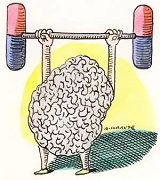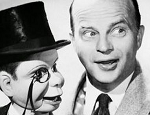I saw today's new-to-me word in an article about communities and websites that feature a certain demographic. Here's the cite:
I don’t think it’s a coincidence that a lot of figures popular in the “redpill” community also hawk nootropic supplements.
I was struck by nootropic not only because I didn't know what it meant, but because there seemed to be nothing in the word that gave me the slightest clue. Even with the context of the sentence, I could only guess what nootropic might mean.
 Anyway, the short definition is "mind-enhancing," and a slang term for nootropical substances is "smart drugs." There's a more formal definition; in fact, when the word was minted in 1964, it had a pretty elaborate definition, as I learned from a writeup on the Dictionary.com site. A nootropic substance is one that:
Anyway, the short definition is "mind-enhancing," and a slang term for nootropical substances is "smart drugs." There's a more formal definition; in fact, when the word was minted in 1964, it had a pretty elaborate definition, as I learned from a writeup on the Dictionary.com site. A nootropic substance is one that:
- Enhances memory.
- Enhances brain function when it's physically stressed (e.g. low oxygen).
- Protects the brain from chemical and physical "assaults."
- Increases the functioning of the brain's "control mechanisms."
- Is non-toxic and has few side effects.
There's a pretty chart on the SmartDrugSmarts.com site that goes into a bit of detail about these 5 characteristics.
Of course, my first reaction when reading all this was "Oh, yeah, coffee." Caffeine definitely fits into the looser, "mind-enhancing" definition of nootropic substances, but I think (?) it doesn't meet the more stringent definitions. But don’t worry, our operators are standing by to take your order for true, pharmaceutical-quality smart drugs, accept no substitutes, hurry, limited-time offer, at this price they won't last.
As for the opaqueness of the term, I guess it's because it's all Greek. The word noos is Greek for "mind." When I looked into it, I found that this root is also in paranoia, but that didn't initially occur to me. The -tropic part was adapted from psychotropic, which refers to mind-altering drugs. In psychotropic, the -tropic part means "to affect " but it ultimately comes from a Greek word meaning "to turn." We see this also in heliotrope (a plant that follows the sun) and trope, a figure (turning) of speech. So nootropic is that which affects the mind. I'm still voting for coffee, fwiw.
For fun origins (or today, even more fun origins), I've got ventriloquist. I was listening to an episode of the Stuff You Should Know podcast that was about ventriloquists, and boy, there was a lot of stuff that I guess I should know.
 Early in the podcast (around 6:30) they talk about how the ancients knew about ventriloquism, but not in the form that we so frequently see today: a person who appears to be talking to a dummy sitting on their knee. Per the podcast, ventriloquism in the old days was more tied in with religion and shamanism—people who could talk to spirits. Those spirits might be in the trees or—here's the origin part—in their stomach. Ventri (or ventro) refers to the abdomen: ventral. And loquism is from "to speak," which is in loquacious, eloquent, and soliloquy. So, ventriloquism is "belly-talking." If I get in touch with my inner eight-year-old, I might think that "belly-talking" is another word for belching. Shows what I know.
Early in the podcast (around 6:30) they talk about how the ancients knew about ventriloquism, but not in the form that we so frequently see today: a person who appears to be talking to a dummy sitting on their knee. Per the podcast, ventriloquism in the old days was more tied in with religion and shamanism—people who could talk to spirits. Those spirits might be in the trees or—here's the origin part—in their stomach. Ventri (or ventro) refers to the abdomen: ventral. And loquism is from "to speak," which is in loquacious, eloquent, and soliloquy. So, ventriloquism is "belly-talking." If I get in touch with my inner eight-year-old, I might think that "belly-talking" is another word for belching. Shows what I know.
Like this? Read all the Friday words.
 |
|

 |
|
